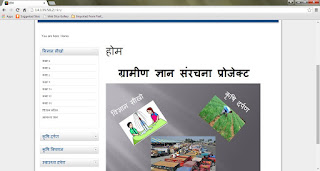 |
| Instructor demonstrating a project |
This case is an educational experiment conducted in six randomly selected
rural schools in Sehore district of the State of Madhya Pradesh in Central
India. The idea of popularisation of science was implemented using “knowledge
network” among budding school children in these schools in a phased manner. The
acceptance or rejection of the “idea” of studying science was closely observed
during the project implementation. The project
implemented was granted by the Ministry of Science & Technology, Government
of India and implemented through National Institute of Technical Teachers’
Training & Research, Bhopal and Department of Education, Government of
Madhya Pradesh.
It was observed
during the initial survey for project casting in 2011 that rural students have
very little or no affinity towards learning science. The high school result of
17 rural schools indicated that 72% students performed poorly (having less than
50% marks in science subjects) in last three years. The project idea cropped up
during the study that to develop interest of the rural students in learning
science. The project on “Rural Knowledge Network through Vigyan evm Vichar Sanchar
Kendras” (Science Information Communication Centres) (VVSK) addresses the
issues of dissemination of scientific information to the grass root level using
ICT.
 |
| Students working on project at Regional Science centre, Bhopal |
To study the interest
of the rural students towards learning science and developing positive attitude
towards learning science, three phases were devised for the implementation,
namely awareness phase, engagement phase and assimilation phase. The students
were engaged in “Karo aur Seekho” (do & learn) in these three phases to
gain insight and interest in the activities conducted.
To advance the student’s interest further in learning
science, it was also decided to develop a “Knowledge Network” a portal to be
made available on web with learning material in the form of narration, pictures
and videos to help students from class 6th to class 12th.
In addition to material of science, this portal also contained information on
health, agriculture and marketing of agriculture produce. This was done with
the intention of attracting not only students but also other rural masses in
learning useful information. All the activities were documented through
questionnaires, observation sheets, video films and pictures.
 |
| Teacher explaining science concept |
The project
provided multiple learning experiences in developing a positive attitude among
rural children. Students in rural areas have inherent aversion towards studies.
This is due to the socio-economic framework, lack of resources in the schools,
poorly trained teachers and lack of motivation and appreciation for learning.
This leads further to rising level of dropouts and increase in number of poorly
motivated students. This project has given significant indicators to develop conducive,
purposeful and sustainable learning experiences for the students to make a dent
in their life.
 |
| Students viewing science lessons |
Creative persons are distinguished more by interest,
attitude, values, motives and drive than intellectual ability alone. It was
observed during the implementation of the project that the students in the
rural areas have ample incubated urge to learn and excel. In the initial Phase of
implementation of project encouraged the non-participating group of students to actively
and enthusiastically involve in creating a competitive learning environment. Students
have to be helped by the teachers to cultivate varied interest areas including
games and play, flexibility, open-mindedness, spirit of cooperation but
competition, a desire to achieve something extraordinary and derive psychic
satisfaction out of such accomplishment comes from the learning environment
created by students themselves.
 |
| Home page of the Software based package |



